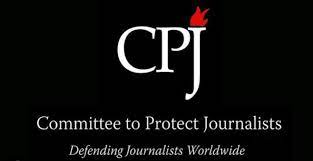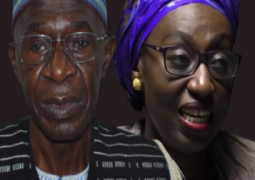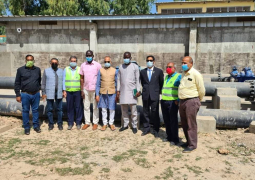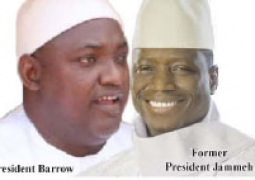
“Police in Senegal should be working to protect the press, not attacking and throwing tear gas at journalists to prevent them from reporting on political demonstrations,” said Angela Quintal, head of CPJ’s Africa programme, in New York. “The detention and beating of journalist Absa Hane is a particularly alarming indication of the lengths Senegalese police seem to be willing to go to stop news coverage they do not like.”
As Senegalese security forces sought to quell protests on February 9 over the postponement of the presidential election until December 15, CPJ documented at least six incidents in the capital, Dakar, in which at least 20 journalists were physically attacked, briefly detained, targeted with tear gas, or harassed in other ways by police.
Police officers grabbed Absa Hane, a reporter with the privately-owned Seneweb news website, then slapped and kicked her until she briefly lost consciousness while detaining her for about 30 minutes in a police vehicle, Hane and Mor Amar, a reporter with the privately-owned EnQuête newspaper, told CPJ. After the incident, Hane posted a summary of the “brutal” attack on X, noting that she knew the identifying number of an officer responsible and would seek accountability.
Amar said that another officer also hit him with his fist and repeatedly insulted him at the same time, as seen in a video recorded by a third reporter. The journalists said they were leaving the area as instructed by the police when the officers threw tear gas at them.
French freelance journalist Thomas Dietrich posted a video on social media and told CPJ that a police officer threw a tear gas canister within “inches” of his face after ordering him to leave a protest.
A police officer threw a tear gas canister toward at least five journalists standing in a street; one of those journalists, Fana Cissé, told CPJ. A video published by the privately-owned news website PressAfrik, where Cissé works as a reporter, shows the officer approaching the journalists, throwing the canister, and the journalists running for cover when it explodes. Cissé also said that an officer grabbed and twisted her arm and, after she got into her car, threatened to throw another tear gas canister into her vehicle if she rolled down the window.
A statement by the Leral media group similarly described the police officer targeting journalists with tear gas and said the same officer also damaged a camera held by one of their reporters by grabbing and pulling out its microphone cable. The PressAfrik video shows the police officer dropping the cable.
Isabelle Bampoky, a reporter for the privately-owned news website Adtv, told CPJ that police officers threw a tear gas canister toward the group of journalists she was with, and it exploded near her foot. A video shared on social media showed her being helped to walk after she had inhaled the tear gas.
Police targeted Sadikh Diop, a cameraperson for the privately-owned news website Senegal 7, with a tear gas canister while he filmed a convoy of police pickup trucks, another Senegal 7 reporter, Matar Cissé, told CPJ.
A video Diop shot of the incident shows the convoy and Diop talking, then him screaming after the canister explodes.
El Hadj Mané, a cameraperson for the privately-owned online television channel Flash Info, and Senegal 7 cameraperson Amidou Sall told CPJ that police fired tear gas towards them and a group of at least eight other journalists conducting an interview near a protest. Mané said that he dislocated his right shoulder and injured his right elbow as he fell while trying to escape the tear gas.
CPJ also documented incidents involving five other journalists in the days before:
On February 5, police officers ordered Ngoné Diop, a reporter for the privately-owned news website Sans Limites to move away as she covered the arrest of an opposition parliamentarian for participating in a banned rally, the journalist told CPJ. Ngoné Diop said that she moved, but police threw a tear gas canister in her direction and then, after she went to a nearby rooftop to continue coverage, an officer followed her, ordered her to move again, and prevented her from filming. A video posted by Sans Limites showed Diop as she was ordered to move.
In three incidents on February 4, officers with the gendarmerie briefly detained or harassed four journalists covering protests over the election delay announced the previous day.
In a separate February 9 incident, police officers fired tear gas into the Dakar courtyard of the Wal Fadjri media group’s offices as its employees staged a sit-in to demand the restoration of the signal of its channel Walf TV, which was cut on February 4, according to Ayoba Faye, a reporter with the media group and news reports. Walf TV resumed broadcasting on February 11, after the media group’s directors met the president, according to a Ministry of Communication statement.
Police spokesperson Mouhamed Guèye told CPJ that he was not in Dakar at the time of the incidents, but that consultations would soon be held with journalists to enable them and police agents to work “in harmony”.
Dakar, February 14, 2024
Read Other Articles In Headlines

Touma Njai voices against D36M budget allocation to Speaker’s Office
Nov 25, 2022, 11:01 AM



